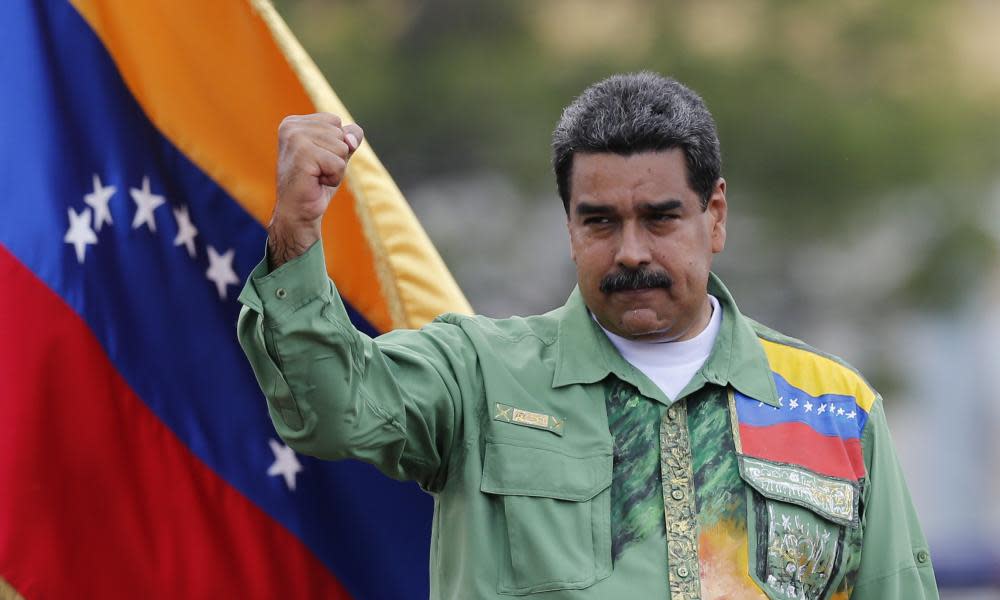The Observer view on Venezuela’s need for profound change, not a sham poll

Is the Trump administration fomenting a military coup in Venezuela? It would not, after all, be the first time the US has been implicated in attempts at regime change there. In April 2002, Venezuela’s elected president, the late Hugo Chávez, was briefly deposed and arrested by the army, before a supporters’ revolt rescued him. The Bush administration denied involvement, but subsequent independent investigations, including by the Observer, suggested “senior officials in the US government” were not only aware of the plot but privately assured its organisers of Washington’s support.
The Observer is the world's oldest Sunday newspaper, founded in 1791. It is published by Guardian News & Media and is editorially independent.
Concern that history may repeat itself has surfaced in connection with today’s presidential election, which Chávez’s less able, less charismatic successor, Nicolás Maduro, is expected to win. US hostility to the Bolivarian socialist revolution led by Chávez and perpetuated, in theory, by Maduro, has not diminished over the years. The US maintains rigorous sanctions and, like the EU and major neighbouring countries, has already dismissed the poll as a sham. Hostile analysts suggest it could be the prelude to Cuba-style dictatorship.
Concern that Trump may intervene has grown following remarks in February by Rex Tillerson, the then US secretary of state, who noted: “The military is often times the agent of change in the history of Venezuela and South American countries [when] the leadership can no longer serve the people.” Florida’s Republican senator, Marco Rubio, recently tweeted: “The world would support the armed forces” if they overthrew Maduro. Clumsy hints have also emanated from Trump’s national security council.
While there are good reasons for wishing Maduro gone, a putsch is the last thing Venezuela needs. What Tillerson forgot to say is that coups in Latin America generally make matters worse, not better. Chávez enjoyed enormous popular support during much of his 14 years as president because he promised to tackle, and did tackle, the injustices, inequalities and crushing poverty of a society traditionally controlled by a privileged, corrupt, self-selecting elite. This work is far from finished.
Chávez used Venezuela’s oil revenues to boost spending on public health, education and nutrition programmes for the urban poor. For a while, he made a positive difference. But his intolerance of political dissent and media criticism, his strident anti-American rhetoric and his support for Fidel Castro’s regime in Cuba and other US bogeymen all served to entrench the enmity of his neighbour to the north, plus that of regional leaders worried that revolution might prove contagious. As is its wont, Washington prioritised political conformity and economic self-interest over necessary social reform.
Maduro, president since 2013, lacks the vision and energy of his predecessor while sharing some of his vices. During his tenure, Venezuela’s economic fortunes have declined disastrously. Due to mismanagement and corruption, oil revenues, the country’s main source of income, have fallen drastically. Hyper-inflation, food shortages, crime and collapsed public services have caused a mass exodus to Colombia and Brazil. Maintaining the undeclared war with Washington, Maduro increasingly looks for support to authoritarian regimes in China and Russia. Last week, he was endorsed by Turkey’s president, Recep Tayyip Erdoğan, another democratically challenged leader.
Despite low approval ratings of around 20%, Maduro will probably win a second term, due in large part to an opposition boycott. His most popular challengers have been excluded from the race, international election observers are barred and, given previous experience of widespread coercion, voter intimidation, fraud and pro-government media bias, expectations of a free and fair poll are almost zero. Some estimates predict a turnout of around 30%.
It seems plain Venezuela needs another revolution. If ever a country required a fresh start, this is it. But this time, the non-ideological emphasis should be on building an inclusive, open democracy. If Maduro cannot bring the country together, he must step aside, regardless of the election “result”. Hardline socialism and capitalism have both failed Venezuela. A different, progressive political path is required. The answer is certainly not a military one.

 Yahoo News
Yahoo News 
